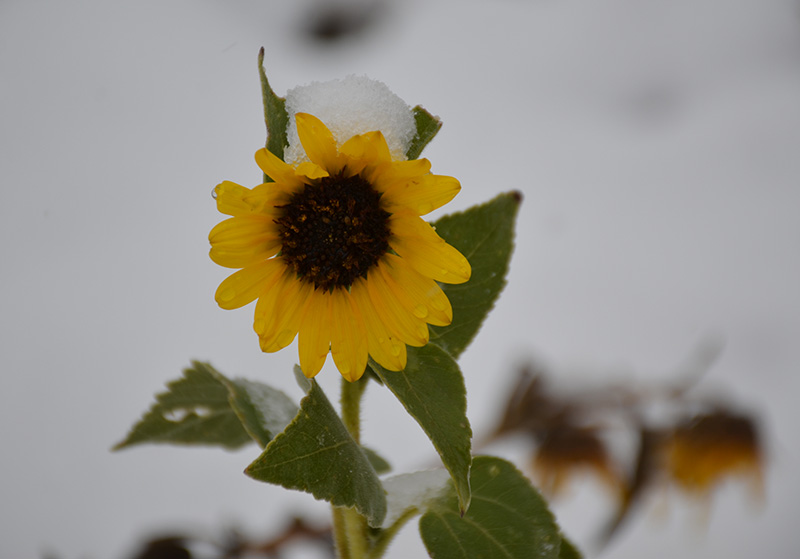
A small sunflower withstands the weight of an early snowfall at Fort Robinson on September 8, 2020. Photo by Irene North.
Single
1. The meaning “consisting of one unit, individual, unaccompanied by others” is from late 14c., often merely emphatic. The meaning “undivided” is from 1580s. 2. How I entered the world. 3. there is only one of me. 4. There is nothing else like me in the world.
Existence
“to have actual being of any kind, actually be at a certain moment or throughout a certain period of time,” c. 1600, from French exister (17c.), from Latin existere/exsistere “to step out, stand forth, emerge, appear; exist, be.” 2. I existed for the betterment of others. 3. I became an individual and a statistic on Nov. 2, 1984 because I had a right to oneself and to my own life. 4. I forged a new life, arising out of despair and a right to exist as I envisioned.
Deserted
c. 1600, transitive, “to leave, abandon,” either in a good or bad sense; 1640s, in reference to military service or duty, “leave without permission;” from French déserter “cause to leave,” literally “undo or sever connection,” from Late Latin desertare, “to abandon, to leave, forsake, give up, leave in the lurch.” Intransitive sense of “quit (a service or post) without permission” is from 1680s. 2. After less than a year, those who knew me in high school, who did not attend college deserted whatever relationship we had 3. I went out into the world, abandoned by all, to seek a new life.
Unaccompanied
1. 1540s, “not in the company of others, having no companions or attendants,” from un- (1) “not” + past participle of accompany (v.). 2. The day I left for college on the plane to Nebraska. 3. On my first solo trip across the Atlantic Ocean to meet new friends.
Solo
1. “single, alone in its kind; one and only, singular, unique; having no husband or wife, in an unmarried state; celibate,” late 14c., from Old French soul “only, alone, just,” from Latin solus “alone, only, single, sole; forsaken; extraordinary.” 2. The way I accomplish any task. 3. Tasks requiring help end in disappointment and are never completed correctly. 4. Twenty-eight years of marriage and there are tasks that still must be done alone in order to preserve the peace.
Alone
1. “unaccompanied, solitary; without companions,” c. 1300, a contraction of all ane, from Old English all ana “unaccompanied, all by oneself,” literally “wholly oneself,” from all “all, wholly.” It preserves the old pronunciation of one. 2. I take my trip each October away from as much human life as I possibly can. 3. The wooden chair protects me from the dangers outside my room. 4. There are no fears of bears, only men. 5. The silence from human speech is an overwhelming joy.
Solitary
1. mid-14c., solitarie, “alone, by oneself or itself, living alone,” from Anglo-French solitarye and Old French solitaire, from Latin solitarius “alone, lonely, isolated,” from solitas “loneliness, solitude,” from solus “alone.” 2. Of places, “remote from society, unfrequented,” late 14c. The meaning “single, sole, only” is by 1742. 3. A hike in Spearfish Canyon. 4. Climbing Cedar Canyon’s butte. 5. Traversing Red Cloud Butte. 6. The trail to the Devil’s Bathtub. 7. Anywhere in nature where I am the only Homo sapiens.
Individual
1. “single object or thing,” c. 1600, from individual (adj.). Meaning “a single human being” is from the 1640s. Colloquial sense of “person” is attested from 1742. Latin individuum as a noun meant “an atom, indivisible particle,” and in Middle English individuum was used in sense of “individual member of a species” (early 15c.). 2. to walk and feel the pebbles, rocks, stones, and boulders, each its own and part of a collective. 3. I hear the waves crash and cascade of them, gurgling on their way toward an unknown destination. 4. I sit in silence and listen to gentle footsteps that pass me by. 5. I am alone. I am one. I am many, all at the same time.
Assuage
1. “soften, alleviate,” usually figuratively, of pain, anger, passion, grief, etc., c. 1300, from Anglo-French assuager, Old French assoagier “soften, moderate, alleviate, calm, soothe, pacify,” from Vulgar Latin *adsuaviare, from Latin ad “to” + suavis “sweet, agreeable.” 2. to provide solace among nature, along the trails and paths for hikers like me seeking solitude. 3. A place of refuge for my soul.
